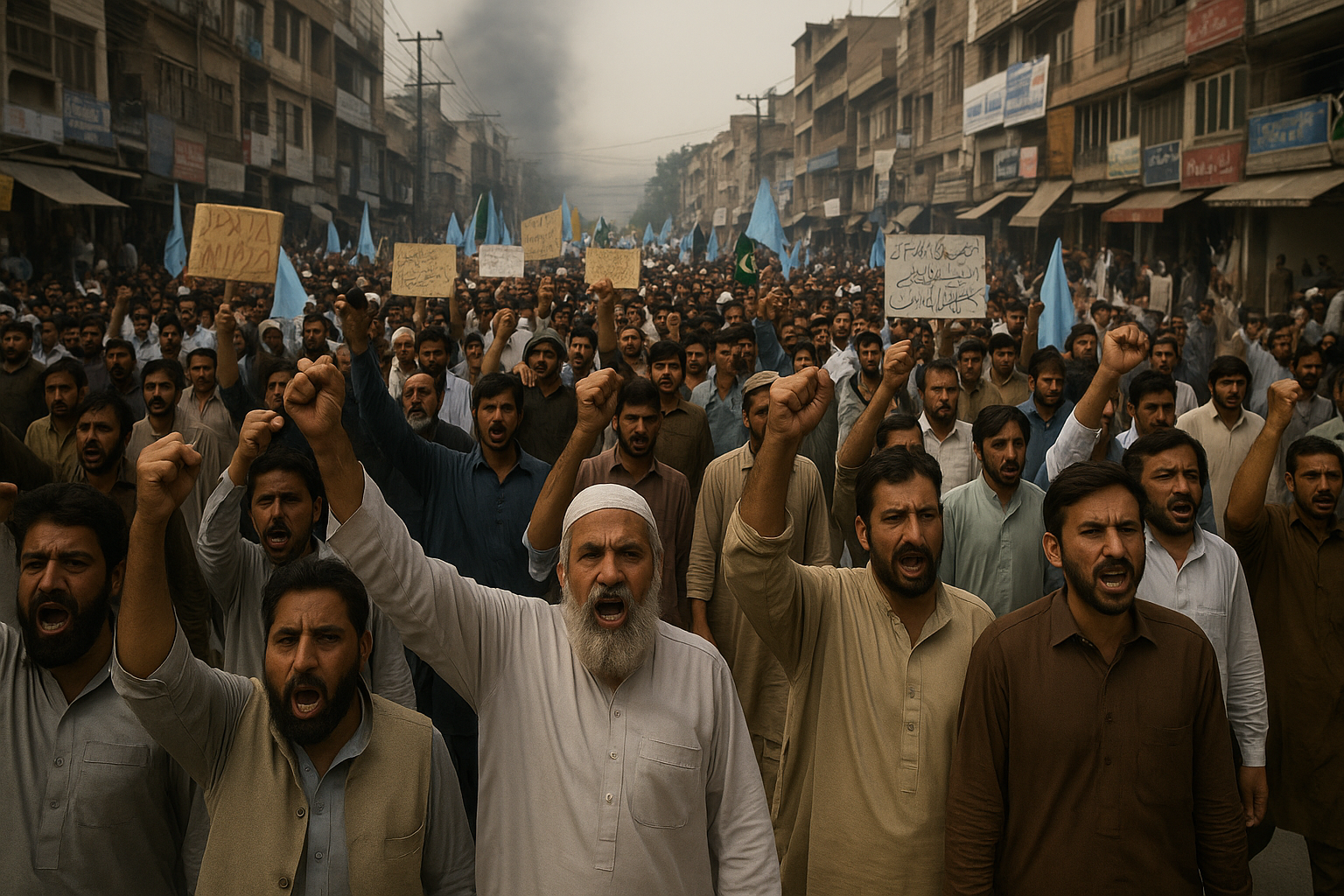The eruption of mass protests in Pakistan-Occupied Jammu & Kashmir (POJK) has once again laid bare the structural fragility of Islamabad’s rule. The region, carved out of the erstwhile princely state of Jammu and Kashmir, has for decades been administered by Pakistan without either constitutional clarity or democratic legitimacy.
The latest demonstrations—organised by the Jammu Kashmir Awami Action Committee (JKAAC) under Shaukat Nawaz Mir—were fuelled by deep-rooted grievances of economic exploitation, political marginalisation, and denial of autonomy. Thousands converged on Muzaffarabad from Rawalakot, Mirpur, Kotli, and Dhirkot, despite state attempts to block them with armed barricades, communication blackouts, and even live fire. At least eight civilians were killed in clashes at Dhirkot, Dadyal, and Muzaffarabad, with dozens more injured.
For Islamabad, accustomed to managing POJK through a mix of patronage and coercion, the ferocity of this mobilisation signals the collapse of familiar instruments of control.
From Proxy Hub to Epicentre of Resistance
Rawalakot, once cultivated by Pakistan’s Inter-Services Intelligence (ISI) as a base for militancy across the Line of Control, has now become the epicentre of resistance against Islamabad itself. In Bagh, local residents captured Punjab police personnel—a remarkable reversal in a territory long subordinated to outside forces.
These are not externally driven disturbances, as the establishment insists. They echo patterns seen in Balochistan and Khyber Pakhtunkhwa, where decades of resource extraction, political exclusion, and military repression have fuelled homegrown resistance. POJK, rich in hydropower potential and strategically located, has been treated in much the same way—its resources channelled outward, its people denied both self-governance and a fair share of development.
A Region Without Rights
The governance vacuum in POJK is neither accidental nor new. Following the first India-Pakistan war in 1947–48, the United Nations passed resolutions calling for a plebiscite in Jammu and Kashmir once Pakistan withdrew its forces from the areas it occupied. That withdrawal never happened. Instead, Pakistan entrenched itself through local “interim” administrations that were never genuinely empowered.
The so-called Azad Jammu and Kashmir (AJK) government exists largely as a façade. The real authority lies with Islamabad’s Ministry of Kashmir Affairs and the powerful military establishment. Key appointments, from civil servants to police chiefs, are made not by local assemblies but by the Pakistani state. Gilgit-Baltistan, the adjoining region administered separately, has been treated in similar fashion. Despite repeated protests from locals, both territories remain outside Pakistan’s constitutional framework, denied provincial status but subject to central diktat.
This ambiguous arrangement allows Islamabad to maintain the rhetoric of a pending “final settlement” on Kashmir, while exercising direct control without extending rights or responsibilities. It is colonialism in practice, masked by the language of interim governance.
Authoritarian Reflexes, Familiar Patterns
The repression witnessed over the past days—armed police firing on protestors, communication shutdowns, and curfews—fits a long-established pattern. In Balochistan, enforced disappearances and military crackdowns have scarred generations. In Khyber Pakhtunkhwa, counter-terror operations often employ heavy weaponry in civilian zones. In Sindh’s interior and South Punjab, deliberate underdevelopment underlines the state’s extractive approach.
Rather than acknowledge legitimate grievances, Pakistan’s establishment habitually externalises blame. Indigenous movements are painted as foreign conspiracies. The Tehreek-e-Taliban Pakistan has been repeatedly branded an “Indian proxy,” while the Baloch insurgency is dismissed as “fitna” orchestrated from abroad. The same tactic is now deployed in POJK, where organic, locally rooted protests are being described as externally sponsored.
International Implications
For Western policymakers, the protests in POJK are more than a domestic challenge for Pakistan. They carry significant implications for regional security and governance.
The turmoil undermines Pakistan’s ability to project control along the Line of Control with India, creating risks of instability in an already volatile border environment. It also signals Pakistan’s continued authoritarian drift, complicating efforts by Western governments to treat Islamabad as a reliable democratic partner. Most importantly, the unrest highlights the precarious condition of marginalised populations living under quasi-legal arrangements—citizens in name, but subjects in practice.
The London chapter of the JKAAC has already announced demonstrations outside the Pakistan High Commission, a reminder that these voices are not confined to the valleys of POJK but are increasingly part of the global conversation on governance and rights.
A Defining Moment
Whether the current wave of protests achieves immediate political concessions remains uncertain. What is clear is that Pakistan’s colonial governance model in POJK is under strain. A proud population, long denied dignity, is asserting its agency against a state apparatus that has exhausted its repertoire of coercion and denial.
For Islamabad, this is a reckoning. To persist with repression will only deepen alienation across its peripheries. To embrace reform would require abandoning decades of centralised control and military dominance. For the international community, the task is to cut through the narratives projected by Pakistan’s establishment and engage honestly with the lived reality of those in POJK.
Until then, Islamabad’s grip on the territory will remain frayed—an occupation dressed as autonomy, a colonial project in all but name.

